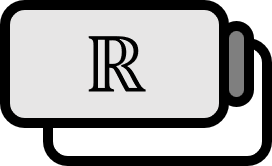Integrability is Preserved in the Multiplication of Two Functions
Theorem1
If two functions $f$ and $g$ are Riemann(-Stieltjes) integrable over the interval $[a,b]$, then $fg$ is also integrable.
Proof
Assume that $f, g$ is integrable. Since integration is linear, $-g,\ f+g,\ f-g$ is also integrable.
Let the function $\phi$ be defined as $\phi (x)=x^2$. Then $\phi$ is continuous over the entire domain. Since integrability is preserved under the composition with continuous functions, $\phi (f+g),\ \phi (f-g)$ is also integrable.
Again, since integration is linear, $\phi (f+g) - \phi (f-g)$ is also integrable. Now, if we define the function $h$ as $h(x)=\dfrac{1}{4}x$, then $h$ is continuous over the entire domain. Once more, since integrability is preserved under the composition with continuous functions, $h\Big(\phi (f+g) - \phi (f-g) \Big)$ is also integrable. However, since the following holds, $fg$ is also integrable.
$$ \begin{align*} h\Big(\phi (f+g) - \phi (f-g) \Big) =&\ \dfrac{1}{4} \Big( \phi (f+g) - \phi (f-g) \Big) \\ =&\ \dfrac{1}{4} \Big( (f+g)^2 - (f-g)^2 \Big) \\ =&\ \dfrac{1}{4} \Big( (f^2 +2fg + g^2) - (f^2 -2fg +g^2 \Big) \\ =&\ \dfrac{1}{4} (4fg) \\ =&\ fg \end{align*} $$
■
Walter Rudin, Principles of Mathmatical Analysis (3rd Edition, 1976), p129 ↩︎
